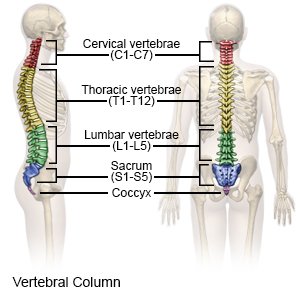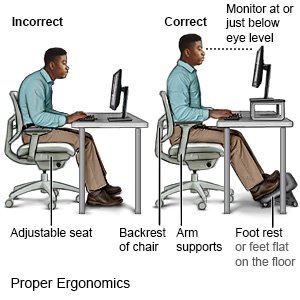Chronic Neck Pain
Medically reviewed by Drugs.com. Last updated on Aug 4, 2025.
What do I need to know about chronic neck pain?
Chronic neck pain may start to build slowly over time. Neck pain is chronic if it lasts longer than 3 months. The pain may come and go, or be worse with certain movements. The pain may be only in your neck, or it may move to your arms, back, or shoulders. You may have pain that starts in another body area and moves to your neck. You may have neck pain for years. Some types of neck pain can be permanent.
 |
What causes or increases my risk for chronic neck pain?
Chronic neck pain is often caused by a joint or disc problem in the neck. Any of the following can cause neck pain:
- Stenosis (narrowing) of your spinal column, or degeneration (breakdown) or inflammation of the discs in your neck
- Inflammation from a condition such as rheumatoid arthritis, polymyalgia rheumatica, or rotator cuff tendinitis
- A condition that affects neck to arm nerves, such as thoracic outlet syndrome or brachial neuritis
- A fracture of a neck bone that causes nerve damage
What other signs or symptoms may I have with chronic neck pain?
The pain may be only in your neck, or it may move to your arms, back, or shoulders. You may also have pain that starts in another body area and moves to your neck. Signs and symptoms will depend on what is causing your pain. You may have any of the following:
- Neck or muscle stiffness
- Tingling or numbness in your arms, hand, or fingers
- Muscle weakness or spasms
- Less range of motion in your neck or shoulder joints
- Nausea or dizziness
How is the cause of chronic neck pain diagnosed?
Your healthcare provider will ask about your symptoms and when they began. Tell him or her if you were recently in an accident or had another injury to your neck. He or she will examine your neck and shoulders. He or she may also have you move your head in certain ways to see if any position causes or relieves the pain.
- Blood tests may be used to measure the amount of inflammation or to check for signs of an infection.
- X-ray or MRI pictures may show a neck injury or medical condition. Do not enter the MRI room with anything metal. Metal can cause serious damage. Tell the healthcare provider if you have any metal in or on your body.
How is chronic neck pain treated?
Treatment will depend on what is causing your pain.
- Medicines may be prescribed or recommended by your healthcare provider for pain. You may need medicine to treat nerve pain or to stop muscle spasms. Medicines may also be given to reduce inflammation. Your healthcare provider may inject medicine into a nerve to block pain. Over-the-counter NSAID medicine or acetaminophen may be recommended to help treat minor pain or inflammation.
- Traction is used to relieve pressure from nerves. Your head is gently pulled up and away from your neck. This stretches muscles and ligaments and makes more room for the spine. Your healthcare provider will tell you the kind of traction that will help your neck pain. Do not use traction devices at home unless directed by your healthcare provider.
- Surgery may be needed if the pain is severe or other treatments do not work. Surgery will not help every kind of neck pain. You may need surgery to stabilize a fractured bone or to remove a tumor. Surgery may also be used to widen a narrowed spinal column or to remove a disc from between neck bones.
What can I do to manage or prevent chronic neck pain?
- Rest your neck as directed. Do not make sudden movements, such as turning your head quickly. Your healthcare provider may recommend you wear a cervical collar for a short time. The collar will prevent you from moving your head. This will give your neck time to heal if an injury is causing your neck pain. Ask your healthcare provider when you can return to sports or other normal daily activities.
- Apply ice for 15 to 20 minutes every hour, or as directed. Use an ice pack, or put crushed ice in a plastic bag. Cover it with a towel before you apply it to your skin. Ice decreases pain and helps prevent tissue damage.
- Apply heat for 20 to 30 minutes every 2 hours, or as directed. Heat helps decrease pain and muscle spasms.
- Do neck exercises as directed. Neck exercises help strengthen the muscles and increase range of motion. Your healthcare provider will tell you which exercises are right for you. He or she may give you instructions, or he or she may recommend that you work with a physical therapist. Your healthcare provider or therapist can make sure you are doing the exercises correctly.
- Maintain good posture. Keep your head and shoulders lifted when you sit. If you work in front of a computer, put the monitor at eye level. You should not need to look up or down to see the screen. You should also not have to lean forward to read what is on the screen. Keep your keyboard, mouse, and other computer items where you do not have to reach for them. Get up often if you work in front of a computer or sit for long periods of time. Stretch or walk around to keep your neck muscles loose.

- Ask about acupuncture for pain relief. Neck pain is sometimes relieved with acupuncture. Talk to your healthcare provider before you get this treatment to make sure it is safe for you.
When should I call my doctor?
- You have neck pain and shooting pain down your arms or legs.
- Your neck pain suddenly becomes severe.
- You have neck pain along with numbness, tingling, or weakness in your arms or legs.
- You have a stiff neck, a headache, and a fever.
- You have new or worsening symptoms.
- Your symptoms continue even after treatment.
- You have questions or concerns about your condition or care.
Care Agreement
You have the right to help plan your care. Learn about your health condition and how it may be treated. Discuss treatment options with your healthcare providers to decide what care you want to receive. You always have the right to refuse treatment. The above information is an educational aid only. It is not intended as medical advice for individual conditions or treatments. Talk to your doctor, nurse or pharmacist before following any medical regimen to see if it is safe and effective for you.© Copyright Merative 2025 Information is for End User's use only and may not be sold, redistributed or otherwise used for commercial purposes.
Learn more about Chronic Neck Pain
Care guides
Further information
Always consult your healthcare provider to ensure the information displayed on this page applies to your personal circumstances.
